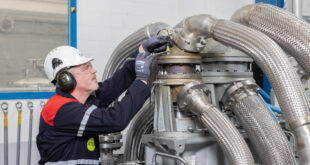In June 2025, the UK government released The UK’s Modern Industrial Strategy for Advanced Manufacturing, outlining the UK’s aim to capitalise on the opportunities of Industry 4.0. However, realising this ambition hinges on embedded technologies designed for efficiency and reliability. Here, Ross Turnbull explains why custom ICs are central to powering the UK’s next industrial leap
By 2035, the UK aims to be recognised as a global leader in advanced manufacturing. Making this vision a reality requires a strong foundation in microelectronics, with semiconductors specifically mentioned in the strategy as critical enablers of automation, connectivity and intelligence. Reflecting this importance, the UK Government has committed an additional £2.6 billion to semiconductor research and development.
The semiconductor family is vast and varied, including general-purpose central processing units, graphics processing units and programmable devices such as Field-Programmable Gate Arrays. Within this family, ASICs occupy a unique and critical role.
A keystone for the UK’s industrial future
ASICs are highly specialised microchips engineered at the transistor level to perform specifically defined functions with precision and efficiency. Unlike general-purpose processors, which are designed to handle a wide range of functions, ASICs provide deterministic, low-latency processing that’s essential for real-time control in industrial automation, robotics and advanced aerospace systems.
By integrating analogue and digital functions, such as signal conditioning, high-resolution data conversion, power management and embedded security onto a single chip, ASICs reduce system complexity, improve reliability and lower power consumption. This consolidation enhances performance in demanding industrial environments by minimising interconnect issues and electromagnetic interference.
ASICs also reduce the chances of obsolescence. By consolidating multiple functions into a single chip, they reduce dependence on off-the-shelf components that may be discontinued or become obsolete. This long-term availability provides UK manufacturers with confidence in the continuity of their products, minimising the need for costly redesigns and safeguarding production lifecycles.
Although ASICs were not explicitly referenced in the new manufacturing strategy, these capabilities make them indispensable for creating the connected, automated and future-ready manufacturing ecosystems the UK aims to develop.
Enabling smart factories
Smart factories are built of interconnected Industrial Internet of Things (IIoT) sensors, advanced robotics, predictive maintenance and adaptive material-handling systems. These systems rely on high-speed data acquisition, real-time processing and energy-efficient control, all while operating reliably in demanding industrial conditions.
ASICs underpin the intelligent systems that make smart factories a reality, embedding specialised processing power directly into the hardware that keeps production moving. ASIC-enabled sensors can process vast streams of operational data in real time, filtering and interpreting it so that only the most relevant information reaches central control systems.
This capability enables faster and more efficient decision-making, supporting predictive maintenance. Sensors can identify subtle shifts in vibration, temperature or current that indicate early machine wear. Acting on these insights before failures occur minimises downtime and extends the lifespan of critical machinery.
Robotics and collaborative systems also depend on custom ICs for the split-second sensor fusion and precise motor control needed to deliver accurate, repeatable movements in dynamic production environments. Automated guided vehicles (AGVs), meanwhile, can use ASIC-powered, low-latency obstacle detection and adaptive routing to maintain a smooth flow of materials through the factory floor.
By enabling these capabilities, ASICs directly support the UK’s industrial strategy goals of increasing manufacturing productivity, improving resource efficiency, and building a more transparent, adaptable, and resilient economy in the face of potential future disruptions.
Reaching new heights
Aerospace remains one of the UK Export Finance’s (UKEF) most active sectors. However, the industry faces ever-growing global competition, particularly from South Korea, Canada and Japan. To stay ahead, the new manufacturing strategy prioritises advanced technical development and digital adoption to drive greater efficiency, supporting more sustainable air travel.
Like with constructing smart factories, ASICs are fundamental to this transition, providing the high levels of integration and customisation required for next-generation aircraft.
Due to their highly customisable nature, multiple functions can be integrated into a single ASIC, significantly reducing the size and weight of avionics, control systems and sensor networks. In aerospace, this capability is extremely advantageous, as every gram saved reduces the thrust required during flight, lowers fuel burn and, in turn, cuts carbon dioxide emissions.
Beyond efficiency, ASICs help unlock the benefits of digitalisation for the aerospace industry, powering real-time sensor fusion, advanced avionics and onboard data processing. This allows aircraft to gather, analyse and act on vast amounts of data in-flight, enhancing situational awareness, predictive maintenance and potentially even autonomous operation.
For the UK aerospace industry, ASICs help develop smarter, more connected aircraft, boosting safety margins and cementing its position as a global leader in sustainable aviation.
As the UK looks to embrace Industry 4.0, investing in semiconductors, particularly ASIC solutions, is more than a technological choice. These highly specialised chips will be instrumental in transforming the UK into a resilient, efficient and forward-thinking manufacturing nation, powering smarter factories and advanced aircraft.
Ross Turnbull is Director of Business Development and Product Engineering at application-specific integrated circuit (ASIC) experts Swindon Silicon Systems.
 Engineer News Network The ultimate online news and information resource for today’s engineer
Engineer News Network The ultimate online news and information resource for today’s engineer


